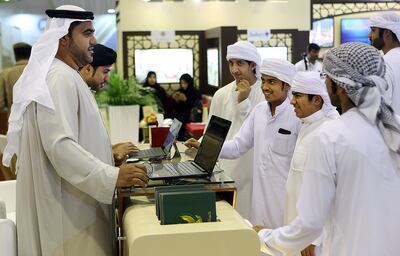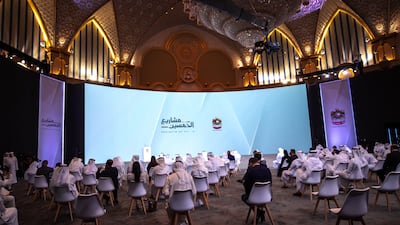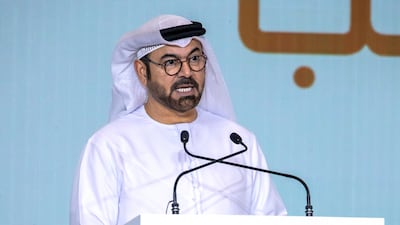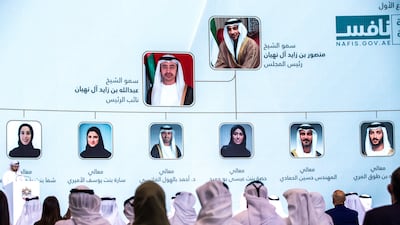Read also: Projects of the 50 - plan to get 75,000 Emiratis into private sector
Private sector employers across the UAE must ensure 10 per cent of their workforce is Emirati in the next five years.
The requirement was among a package of 13 projects and decrees designed to boost the number of Emiratis in the private sector by 75,000 in the next half-decade.
Emirati Talent Competitiveness Council
These included paid training programmes, subsidies for Emiratis working in the private sector and support for local entrepreneurs looking to leave the public sector and start up their own companies.
The latest effort will aim to have Emiratis fill 10 per cent of skilled roles in private companies within five years.
Ghannam Al Mazrouei, general secretary of the newly formed Emirati Talent Competitiveness Council, said the government had consulted with private companies, federal entities, young people and experts in human resources to come up with a national programme to achieve the 10 per cent target.
"We will work together with the private sector in order to achieve this percentage," Mr Al Mazrouei said.
"Unskilled labourers will not be counted, only the skilled labour will be within in our target.
"There will be lots of collaboration, meetings and workshops to help identify what the challenges are, and how we can help them to accelerate our highly talented UAE nationals into the private sector, in order to add value to the economy."
The government will support the cost of training citizens in the private sector for up to a year, with a monthly salary of Dh8,000 for university fees.
Separately, funding of Dh1.25bn has been allocated to train Emiratis and prepare them for specialised private sector roles, in partnership with the CFA Institute, Google Awards and the International Association of Business Analytics Certification.
Meanwhile practical training will be organised by the Abu Dhabi Centre for Technical and Vocational Education and Training.
Bonuses for low-income Emiratis

The new plans also included strategies to encourage more Emiratis to choose the private over the public sector, where the vast majority work.
Financial incentives were announced by Mr Al Mazrouei, who said, "We want to motivate UAE nationals to work in the private sector."
"What we have seen in the last 50 years is that the private sector has contributed a lot, and now what we want is the private sector to lead the economy for the next 50 years, and to deploy more UAE nationals," he said.
These bonuses included a Dh5,000 monthly top-up for a period of five years for Emirati university graduates who take a role in a privately-owned company.
An allowance of Dh800 per child per month will also be paid to Emirati parents, up to a maximum amount of Dh3,200 per family, for people on salaries under Dh20,000.
Pensions for those in lower paid jobs will also be supplemented by government funds for the next five years.
If an Emirati should lose their job in the private sector, they will be supported by the state for up to six months, while they look for a new role.
Meanwhile, Emirati nationals working in specialised fields in the private sector, such as programmers, nurses, accountants, and others will receive a fixed bonus of Dh5,000 per month above their salary for a period of five years.
Nevin Lewis, the chief executive of Black and Grey Human Resources in the UAE, said the salary supplements would make all the difference.
“Now the bonus from the government acts as an equaliser, Emirati jobseekers would be open to positions that offer learning and growth opportunities,” said Mr Lewis.
A head start for entrepreneurs

Emiratis in public sector employment, and those nearing retirement were also encouraged to leave their current jobs, and set up their own companies.
As of next year, federal government employees can take a six or 12-month sabbatical on 50 per cent pay so as to start their own business, and employees aged over 50 can take early retirement to do the same.
Enterprising graduates will also be supported by the government, in partnership with local universities, said Mr Al Mazrouei.
"The leadership have assigned Dh1billion to be allocated for young entrepreneurs. This is a signal from the leadership that we will support all of these young entrepreneurs so they can add value to the local economy."
These 13 policies were the second batch from the UAE's 50 Projects for the future, which was first announced on September 2.
Business leaders invited to the launch praised the initiative. Alain Bejjani, the CEO of the mall operator, Majid Al Futtaim, which employs thousands of staff in the UAE described the initiatives as "thoroughly thought-out and well-prepared".
"We believe that localisation brings a competitive advantage for private sector, and the private sector has not just a role to play, but actually a benefit to gain out of localisation and this is why at Majid Al Futtaim, we've always been going down that road," said Mr Bejjani, who is from Lebanon.
Emiratis looking to find out more about the new incentives can visit the Nafis website. The next collection of policies are due to be launched on Sunday.









